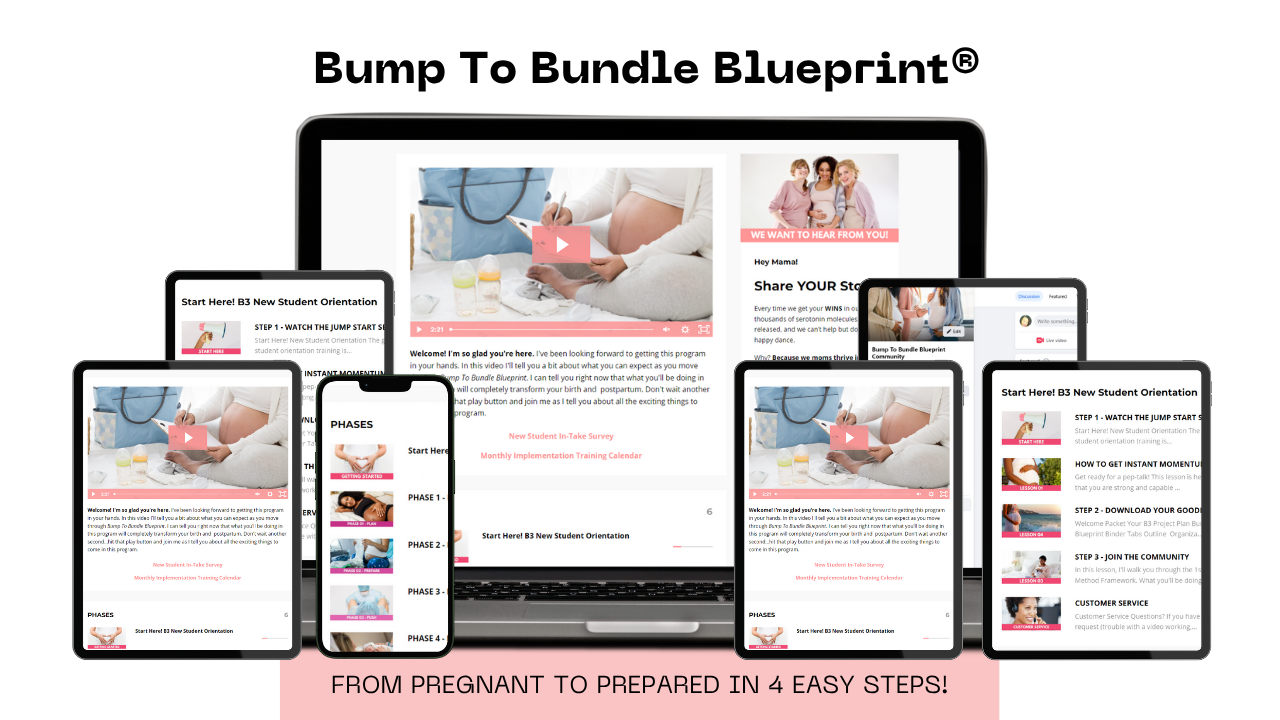Avoid These 5 Breastfeeding Challenges Every New Mom Faces

Breastfeeding can be one of the most beautiful yet challenging aspects of motherhood.
As a new or soon-to-be mom, you're likely filled with questions: Will I be able to breastfeed? What if I don’t produce enough milk? What if my baby won’t latch? These concerns are incredibly common, and it's totally normal to feel nervous. But with the right knowledge, you can tackle these challenges like a pro.
Hi, I’m Stephanie Poole, a certified lactation consultant and doula. I’ve helped countless pregnant moms confidently prepare for breastfeeding, and today I’m going to walk you through some of the most common breastfeeding challenges and how to overcome them. By the end of this post, you’ll feel more empowered and ready to take on your breastfeeding journey!
1. Latching Problems: The Most Common Issue
Latching issues are at the top of the list for many new moms. You've probably heard that if your baby doesn’t latch properly, breastfeeding can hurt—and that's true. An improper latch can cause sore, cracked nipples, making feeding uncomfortable for both you and your baby.
Here’s what to do:
- Positioning is key: Ensure your baby’s head, neck, and spine are aligned. Hold your baby close, tummy to tummy, with their nose level with your nipple.
- Deep latch: Aim for your baby to take both your nipple and a portion of the areola. A deep latch will help prevent pain and ensure your baby is getting enough milk.
- Seek help early: If the latch still feels off, reach out to a lactation consultant for guidance. Sometimes, a small adjustment can make a world of difference.
2. Low Milk Supply: What You Need to Know
Another big concern for new moms is whether they’ll produce enough milk. It’s understandable to worry, especially when there’s so much misinformation floating around.
Here’s how to naturally boost your milk supply:
- Feed frequently: Breastfeeding works on a demand-supply system. The more your baby nurses, the more milk your body will produce.
- Stay hydrated: Dehydration can affect milk production. Drink plenty of water throughout the day to support your supply.
- Eat milk-boosting foods: Foods like oats, flaxseeds, and leafy greens are known to support lactation. Incorporating these into your diet can help keep your supply up.
3. Engorgement: What to Expect
Around days 3 to 5 postpartum, your milk will come in, and this sudden increase can cause your breasts to become engorged—painfully full. This can make it tough for your baby to latch and can be uncomfortable for you.
Here’s how to ease engorgement:
- Frequent nursing: Feed often to prevent your breasts from becoming overly full.
- Hand expression or pumping: If your baby isn’t latching right away, hand express or use a pump to relieve pressure.
- Cold compress: Apply a cold compress after nursing to reduce swelling and discomfort.
4. Nipple Pain and Cracks: A Common Struggle
Breastfeeding shouldn’t be painful, but it’s not uncommon to experience some soreness, especially in the beginning. Cracked or sore nipples are usually a sign that something isn’t quite right with your baby’s latch or positioning.
Here’s what to do:
- Focus on the latch: Get as much of the areola into your baby’s mouth as possible to prevent discomfort.
- Use nipple cream: A lanolin-based cream can soothe and heal cracked skin.
- Air-dry: Let your nipples air-dry after feeding to speed up the healing process.
5. The Emotional Side of Breastfeeding
Breastfeeding isn’t just a physical journey—it’s emotional too. The pressure to “get it right” can feel overwhelming, and it’s common to worry whether your baby is getting enough milk.
Here’s how to navigate the emotional side:
- Take it one feeding at a time: Breastfeeding is a learning process for both you and your baby. Give yourself grace and patience.
- Build a support system: Join a community of breastfeeding moms who understand what you’re going through. Surrounding yourself with support can make a huge difference.
- Ask for help: Don’t hesitate to reach out for help. Whether it’s a lactation consultant or a supportive friend, you don’t have to go through this alone.
Ready for Breastfeeding Success?
Breastfeeding may come with its challenges, but with the right preparation and support, you can overcome each one. If you're looking for a comprehensive guide to prepare for birth and breastfeeding, check out my Bump to Bundle Blueprint. It includes my childbirth masterclass, birth plan system, and a mini breastfeeding course that will help you get started on the right foot.
Rate, Review, & Follow on Apple Podcasts
“I love the Oh Baybee! Podcast” <– If that sounds like you, please consider rating and reviewing my show! This helps me support more mamas — just like you — as they transition into motherhood. Click here, scroll to the bottom, tap to rate with five stars, and select “Write a Review.” Then be sure to let me know what you loved most about the episode!
Also, if you haven’t done so already, follow the podcast. I’m adding a bunch of bonus episodes to the feed and, if you’re not following, there’s a good chance you’ll miss out. Follow now!
Links mentioned in this episode:
3 Mistakes Pregnant Moms Make When Preparing for Their First Birth (+ what to do instead) https://www.birthprepacademy.com/masterclass
Prepare for your first hospital birth with a stress-free birth blueprint in 6 weeks!
COMPLIMENTARY GUIDE
How To Skyrocket Your Milk Supply (...from birth and beyond) https://www.birthprepacademy.com/milksupply
WEBSITE
Let's continue the conversation.
https://www.birthprepacademy.com/
Let me know how you liked the podcast and if the episode and tag me (@birthprepacademy) so I can repost!
https://www.instagram.com/birthprepacademy/




